Enjoy Delicious Vegetarian Meals

One of the benefits of the vegetarian diet is that it is delicious. Make your meals from a variety of fruits, vegetables, whole grains, and beans. You can eat exclusively vegetarian or just make some of your meals meatless. The choice is yours. You have the flexibility to eat vegetarian all the time or just sometimes.
What Is a Vegetarian Diet?

There are many variations of a vegetarian diet. On one end of the spectrum, vegan diets consist strictly of plant-based foods. People who follow this type of vegetarian diet do not eat meat, fish, milk, eggs, or honey. So-called lacto vegetarians eat plant-based foods and dairy products. People who eat a lacto-ovo vegetarian diet eat plant-based foods, eggs, and dairy products. Pescatarians eat plant-based foods and seafood. Some people follow a partial vegetarian diet in which they eat plant-based foods, eggs, dairy products, chicken, or fish, but they avoid red meat.
Get Adequate Protein

It is possible to get adequate protein from a vegetarian diet, but you need to make smart choices. Good sources of protein include beans, eggs, peas, nuts, and soy products like veggie burgers, tempeh, and tofu. It can be challenging to consume enough calories by eating a vegetarian diet, but it is possible. Eat a mix of protein and carbs with every meal to get adequate protein and calories. Black beans and rice supply protein and carbs. Add a side salad and you have a complete vegetarian meal.
Make Smart Substitutions

One of the benefits of the vegetarian diet is that it is easy to substitute other ingredients for meat in your favorite dishes. If you are making lasagna, ditch the ground beef and use spinach or tofu instead to decrease the fat and calories in this Italian staple.
Vegetarian-Style Stuffed Peppers
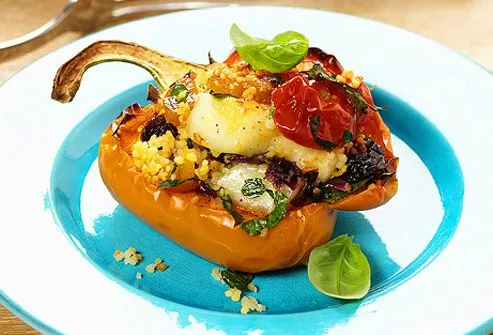
You don't need to make stuffed peppers with ground beef. You can use rice, veggies, meatless sausage crumbles, and beans along with your usual seasoning to make this popular dish.
Have a Veggie Omelet

Eggs are a great addition to a vegetarian high-protein diet plan. You don't need to make omelets using ham and cheese. You can make a Spanish-style vegetarian omelet with onions, red peppers, zucchini, mushrooms, potatoes, and seasoning. Mushroom and spinach omelets are great, too.
Try Eggplant Parmesan
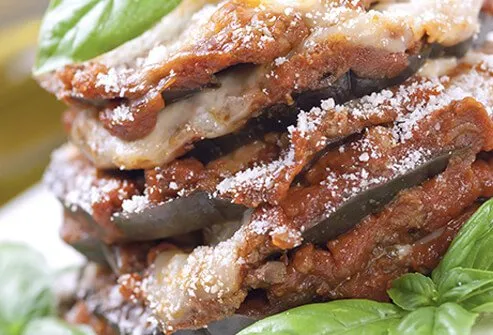
Some people want to eat a vegetarian diet for weight loss. If that is the case, add eggplant Parmesan to the menu in place of chicken Parmesan. Make the dish using thin slices of eggplant instead of chicken. You can even use soy-based cheese substitute or another type of vegan cheese instead of traditional dairy Parmesan.
Opt for Vegetarian Chili

Warm, hearty, spicy chili is a welcome dish, especially on a cold day, but you can enjoy this favorite without the meat. Substitute extra beans or tofu in place of the meat and just add your usual seasonings.
Serve Up Portobello Burgers
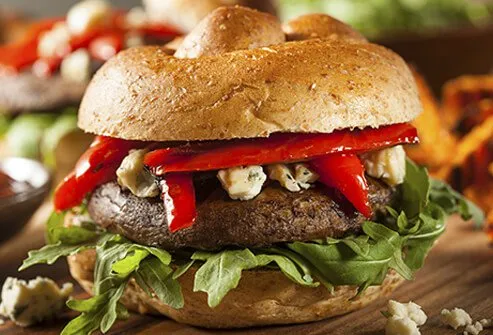
Cheeseburgers are laden with saturated fat and are high in calories. If you are in search of a weight loss diet for vegetarians, make sure to include Portobello mushroom burgers on the menu. Season and grill the mushroom cap the way you normally would a beef patty. Top with lettuce, tomato, cheese, and condiments on a whole wheat bun and enjoy!
Try a Veggie Burger
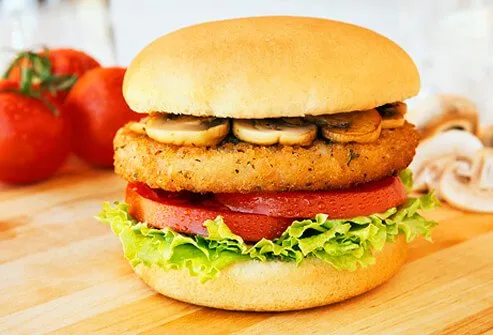
If you like the texture of a hamburger but want to skip the meat, add veggie burgers to the menu. Several type of frozen veggie burgers are commercially available. Typical ingredients include vegetables, beans, grains, and soy. You can also make your own veggie burgers using these ingredients. You can make black bean burgers out of black beans, brown rice, garlic, eggs, scallions, and spices. Veggie burgers provide needed protein and fiber.
Choose More Soy

Soy products are an ideal meat substitute. They are high in protein and can be seasoned to approximate the taste of meat. You can use tofu to make tasty kabobs. Several soy products are commercially available, like meatless chicken nuggets, hot dogs, and breakfast crumbles and sausages. Edamame makes a great snack. These are unprocessed soybeans.
Is Vegetarian the Healthiest Diet?

Is a vegetarian diet healthier than other diets? Since vegetarian diets tend to be low in animal products or eliminate them all together, they are low in cholesterol and saturated fat. Numerous studies have shown that people who eat a vegetarian diet have a lower risk of heart disease, type 2 diabetes, and cancer. Diets high in antioxidant-rich fruits and vegetables are beneficial to health and may help reduce the risk of cancer.
Get Adequate Nutrient Intake

Can you get adequate nutrients if you are eating a vegetarian or vegan diet? Animal products supply vitamin B12, iron, calcium, zinc, and vitamin D. It can be challenging to get enough of these nutrients if you are a vegetarian or vegan. See a dietitian if you need help making sure you're covering all your nutritional bases.
Fill Up on Calcium and Vitamin D

Vegetarians who eat dairy products probably get adequate calcium to support bone health from milk, yogurt, and cheese. If you eat a vegan diet and do not consume any dairy products, you need to make sure you get ample calcium from fortified foods like milk substitutes and orange juice. Nuts, seeds, and certain green veggies supply small amounts of calcium. Dairy products contain vitamin D, so vegans need to ensure they get adequate amounts of this nutrient from fortified cereal, orange juice, milk substitutes, and tofu.
Fill Up on Zinc

Your body absorbs zinc best from meat, but other foods can help you meet your daily requirements for this mineral. Good sources of zinc include whole-grain breads, milk, cheese, soy products, nuts, and legumes like chickpeas. Hummus on whole-grain toast or whole-grain pita bread is a zinc-rich snack.
Pump Up Iron Intake
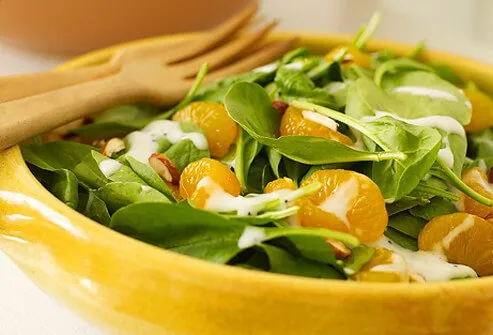
Iron is best absorbed from meat, so people who don't eat meat need to make sure they are consuming other iron-rich foods. Good vegetarian sources of iron include fortified cereals and grains, leafy green veggies, tofu, and cooked dry beans. Eat iron-rich foods along with foods rich in vitamin C since vitamin C boosts iron absorption.
Get Your Fill of Omega-3s
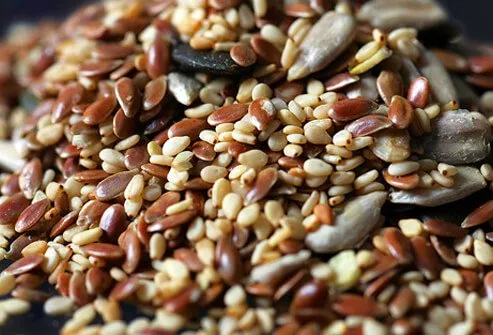
Every diet contains adequate healthy fats. Omega-3s are helpful anti-inflammatory fats that benefit your heart, brain, and blood pressure. There are three main types of omega-3 fatty acids. The majority of health benefits come from docosahexaenoic acid (DHA), an oil that is found in fatty fish and fortified eggs. Vegetarians and vegans who do not consume fatty fish or DHA-fortified eggs should consider taking a supplement to get this all-important nutrient. Another beneficial omega-3 fatty acid is alpha-linolenic acid (ALA), which is found in flaxseeds, walnuts, canola oil, and pumpkin seeds.
Get Your Vitamin B12
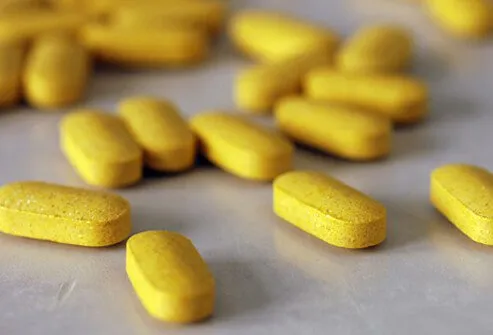
Inadequate levels of vitamin B12 can lead to fatigue and muscle weakness. Animal products like meat, dairy products, and eggs contain vitamin B12. If you avoid these foods, make sure to eat foods that are fortified with vitamin B12 or discuss taking a supplement with your doctor.
Are Vegetarian Diets Good for Kids?

It is safe to feed your children a vegetarian diet and it is probably beneficial for them. Make sure children get adequate fats. Dairy products, peanut butter, nuts, and eggs provide much-needed fats. If you have questions about feeding your children a vegetarian diet, consult with your doctor, dietitian, or nutritionist.
Part-Time Vegetarian

Eating a vegetarian diet 1 or 2 days a week can provide health benefits by decreasing the amount of saturated fat and cholesterol you consume. Eating vegetarian a few days a week will mean you naturally eat more antioxidant-rich fruits and vegetables. If you eat this way a few times per week, you might like the way you feel and do it more often.
Vegetarian Diet: Benefits, Meat Substitutions, and Meal Plans
This tool does not provide medical advice. See additional information: 
© 1996-2024 WebMD, LLC. All rights reserved.
